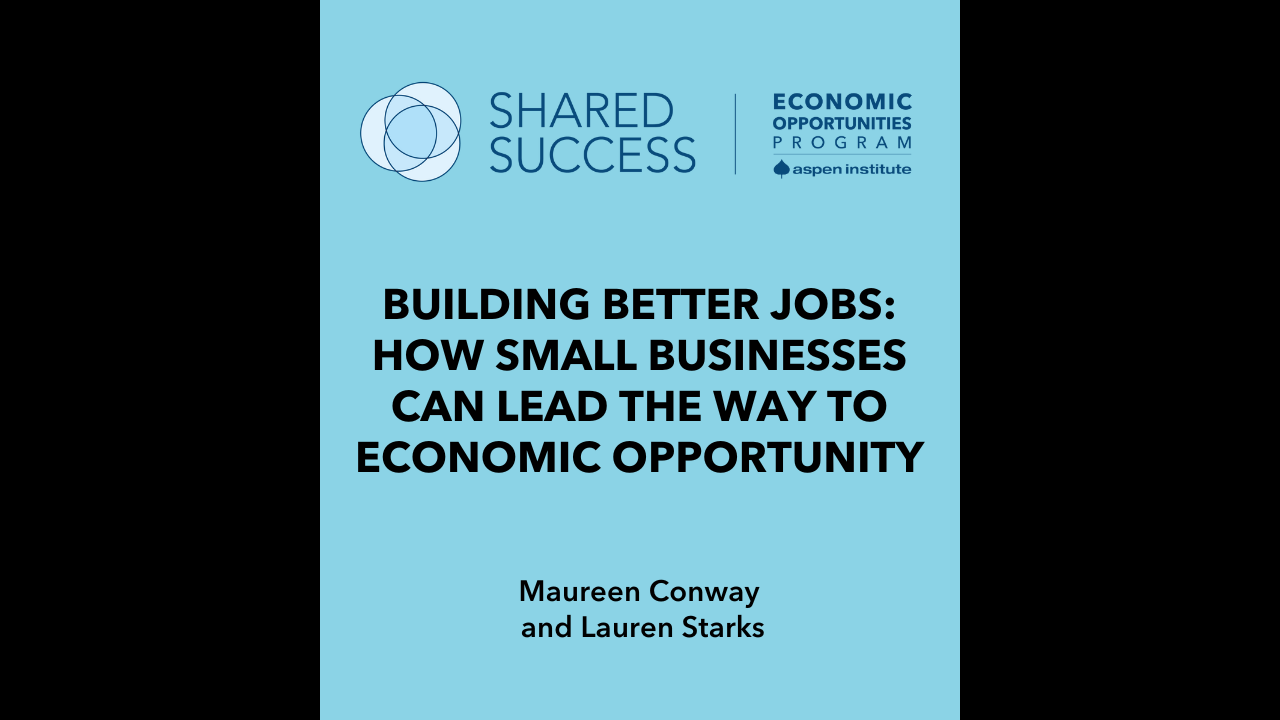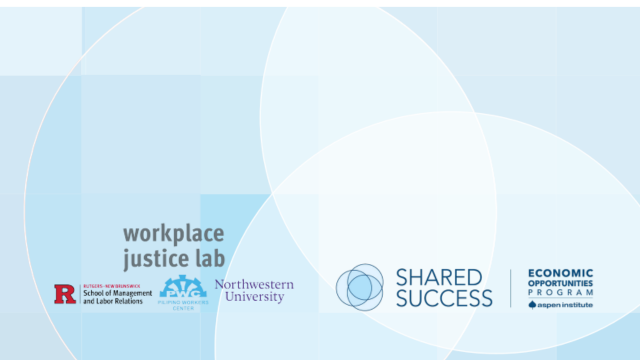Building Better Jobs: How Small Businesses Can Lead the Way to Economic Opportunity

Lauren Starks
Director

Maureen Conway
Vice President; Executive Director
The idea that hard work leads to opportunity is the cornerstone of the American Dream. But for millions across the United States, poor job quality prevents that dream from becoming reality. Low wages, lack of benefits, unpredictable schedules, unsafe or demeaning working conditions, and limited worker voice have left many stuck in jobs that don’t offer the security, dignity, or prospects they need.
The Reality of Low Job Quality
A growing body of research paints a stark picture:
- A third of US workers earn less than $15 per hour (Oxfam U.S.).
- Only 31% of US workers feel engaged at work, while 50% experience daily stress and 22% feel daily sadness (Gallup’s State of the Global Workplace).
- A third of hourly workers struggle with inconsistent scheduling (The Shift Project, Harvard).
Poor job quality takes a significant toll not only on workers, but also on businesses of all sizes, contributing to declining productivity, high turnover, and difficulties attracting and retaining talent (U.S. Chamber of Commerce). For small businesses, which employ nearly half of the US workforce and have limited resources to compete in the labor market, addressing low job quality is particularly critical.
A Path to Better Jobs
The Shared Success project shows that it doesn’t have to be this way. Launched by the Aspen Institute’s Economic Opportunities Program and funded by the Gates Foundation, Shared Success reveals the potential for even the smallest employers to transform job quality.
Shared Success works in partnership with community development financial institutions (CDFIs) who advise and incentivize small businesses to make practical improvements to wages, benefits, schedules, and working conditions.
A national survey of 760 small business workers spanning seven major employment sectors was recently conducted as part of Shared Success, and the findings reinforce the importance of quality jobs to employee satisfaction.
Workers cited five priorities:
- Competitive pay
- Work-life balance
- Job security
- Positive work environments
- Comprehensive benefits packages
Yet, many small business workers reported that these needs were not being met, particularly when it came to benefits. While 60% of respondents identified paid time off, paid sick leave for health-related reasons, and health insurance as “must-have” benefits, fewer than half of workers reported having access to them.
Through Shared Success, participating businesses demonstrated that improvements in job quality and overall benefits are both possible and effective. In a survey of Shared Success business owners*:
- More than half of respondents reported improvements in productivity or revenues.
- Nearly 60% credited their partnership with a CDFI for giving them resources to improve job quality.
- 63% reported making changes to create a more supportive environment, including respectful supervision.
- 54% reported improving compensation to be competitive.
*From forthcoming final report.
This points to a win-win scenario where both employees and employers reap the rewards of better jobs.
Shared Success in Action: The Business Perspective
Boulder-based Ember Salon illustrates how small businesses can successfully invest in job quality. Owner Jamie Nelson partnered with Colorado Enterprise Fund’s Quality Jobs Program to overcome financial barriers.
With the guidance of the Colorado Enterprise Fund, a CDFI serving small businesses in Colorado, Nelson implemented onsite professional development and coaching sessions to support employee growth and increased commission rates and wage evaluations to ensure competitive pay.
Reflecting on the experience, Nelson shared, “It not only helped my business, it helped me in stepping into that next phase and chapter of my life of being a leader and a mentor.”
Increased employee satisfaction improved client retention, as workers felt more connected to the organization. Nelson’s key takeaway: “After I did the Quality Jobs Program, I realized you can’t afford to not invest in your team.”
A Shared Path Forward
Shared Success demonstrates that we can have good jobs and thriving businesses. But changing business as usual doesn’t happen automatically. Organizations that support small businesses with the right tools, guidance, and financial resources, can make an outsize impact on their local economy and community.
By investing in programs like Shared Success that empower small businesses to offer better jobs, we take an essential step in rebuilding the American Dream. The path forward is clear: Quality jobs benefit workers, strengthen businesses, and create stronger, more resilient communities.
To learn more about improving job quality and discover tools to support this work, visit the Shared Success page.
About Shared Success
Shared Success, a project of the Aspen Institute Economic Opportunities Program, shows how building better jobs can simultaneously uplift workers while also driving small business success.
About the Economic Opportunities Program
The Aspen Institute Economic Opportunities Program advances strategies, policies, and ideas to help low- and moderate-income people thrive in a changing economy.
Join Our Mailing List
To receive occasional emails about our work — including new publications, commentary, events, fellowships, and more — join our mailing list.
Connect on Social Media
For news and updates every day, connect with us on the social media platform of your choice.








